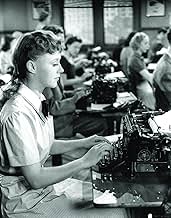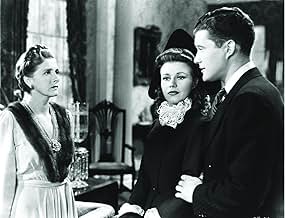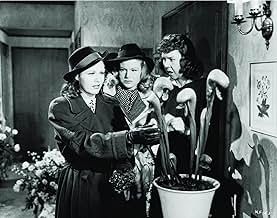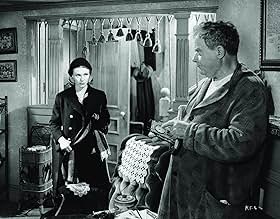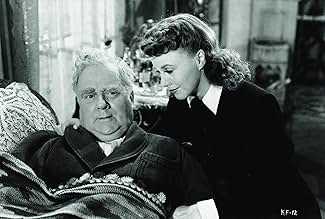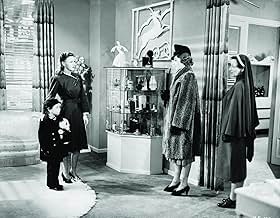IMDb रेटिंग
6.9/10
4.3 हज़ार
आपकी रेटिंग
अपनी भाषा में प्लॉट जोड़ेंA hard-working white-collar girl from a middle-class family meets and falls in love with a young socialite, but she soon clashes with his family.A hard-working white-collar girl from a middle-class family meets and falls in love with a young socialite, but she soon clashes with his family.A hard-working white-collar girl from a middle-class family meets and falls in love with a young socialite, but she soon clashes with his family.
- निर्देशक
- लेखक
- स्टार
- 1 ऑस्कर जीते
- 4 जीत और कुल 4 नामांकन
Eduardo Ciannelli
- Giono
- (as Edward Ciannelli)
K.T. Stevens
- Molly
- (as Katharine Stevens)
Spencer Charters
- Father
- (काटे गए सीन)
Fred Aldrich
- Man at Premiere
- (बिना क्रेडिट के)
- …
फ़ीचर्ड समीक्षाएं
And not just because my name is kit. The chemistry between Ginger Rogers and Dennis Morgan is unlike any other screen romance I've ever seen. Total smolder city. Rogers mixes idealism and cynicism has stunningly as it can be done. Morgan nicely tightropes between strength and fecklessness. The supporting cast, in entirety, is magnificent. Just a tremendous movie. In fact, I just got inspiration -- following the recording of this review -- I will change my IMDB handle to kittyfoyle.
While I am quite fond of Ginger Rogers - both her performances and her personality - "Kitty Foyle" is not an Oscar-worthy film. Yes, she does a great job, but not superior to Hepburn ("The Philadelphia Story"), Davis ("The Letter"), Fontaine ("Rebecca") or Scott ("Our Town") - all nominated actresses in the same category.
The book upon which this film is based was somewhat controversial at the time - abortion, extramarital affairs, etc. - all verboten by the Production Code of the 40s/50s. Yes, they "cleaned up" the story for the screenplay, but it is still somewhat risque for 1940. Most likely, the subject matter contributed to Rogers winning the Oscar. (Of course, "The Philadelphia Story" is a bit suggestive as well - and certainly more sophisticated.)
Distracting to me are the unnecessary "prologue," and Rogers portraying (briefly) a twelve year-old! The scenes with her two female roommates are a welcome comedic interlude. Unlikely is the prospect of Foyle secretly giving her ex-boyfriend's engagement ring to his young son, and expecting the child's mother to never see it.
This is worth viewing, of course, but the Oscar went to the wrong person.
The book upon which this film is based was somewhat controversial at the time - abortion, extramarital affairs, etc. - all verboten by the Production Code of the 40s/50s. Yes, they "cleaned up" the story for the screenplay, but it is still somewhat risque for 1940. Most likely, the subject matter contributed to Rogers winning the Oscar. (Of course, "The Philadelphia Story" is a bit suggestive as well - and certainly more sophisticated.)
Distracting to me are the unnecessary "prologue," and Rogers portraying (briefly) a twelve year-old! The scenes with her two female roommates are a welcome comedic interlude. Unlikely is the prospect of Foyle secretly giving her ex-boyfriend's engagement ring to his young son, and expecting the child's mother to never see it.
This is worth viewing, of course, but the Oscar went to the wrong person.
The movie opens with a young woman, Kitty Foyle, assisting her doctor-sweetheart in delivering a child in a ramshackle tenement. They are a very compassionate pair. Afterwards he proposes marriage, she accepts and agrees meet him at midnight to be immediately married by an all-night Justice of the Peace. But while packing back at her hotel room, in pops an old flame, a wealthy married man who Kitty still desperately loves. He announces he has left his family and is leaving that night at midnight for South America. He still loves her, and wants her to join him. Oh, Kitty, what to do?
The remainder of the film is a series of flashbacks prompted by Kitty's image of herself in the mirror (i.e., her conscience) as it attempts to direct Kitty to the proper decision. Starting with her teenage years growing up working-class Irish in 1920s Philadelphia we learn how poor Kitty met and fell in love with a rich Mainline aristocat, and got herself in such a predicament.
Ms. Rogers won best actress for her role as Kitty, but the rest of the cast is no less deserving. A real movie treat.
The remainder of the film is a series of flashbacks prompted by Kitty's image of herself in the mirror (i.e., her conscience) as it attempts to direct Kitty to the proper decision. Starting with her teenage years growing up working-class Irish in 1920s Philadelphia we learn how poor Kitty met and fell in love with a rich Mainline aristocat, and got herself in such a predicament.
Ms. Rogers won best actress for her role as Kitty, but the rest of the cast is no less deserving. A real movie treat.
10Ariana-6
A wonderful story of a young woman caught between two worlds, what she wants and what she needs. This has got to be one of the best stories of all time. Ginger Rogers gives an outstanding performance of a young woman from the wrong side of the tracks that stands up to society and makes her way on her own.
It is incredibly forward thinking for the time period and yet it deals with struggles that seem to be timeless.
I give it as many stars as can be given.
Ariana Eirlys
It is incredibly forward thinking for the time period and yet it deals with struggles that seem to be timeless.
I give it as many stars as can be given.
Ariana Eirlys
This must have been the year for the City of Brotherly Love. James Stewart wins his Academy Award for The Philadelphia Story and Ginger Rogers who he was going out with at some point, wins Best Actress for Kitty Foyle, a film also set in Philadelphia. Too bad neither the Athletics or the Phillies won the World Series that year, but neither of them came close.
Although Stage Door more than amply demonstrated Ginger Rogers's abilities at serious drama, this particular film cemented her as dramatic actress. Most of Ginger's films up to this point had been musicals, mostly with Fred Astaire. After Kitty Foyle she rarely did any musicals.
The story is told in flashback after Ginger engages in some dialog with her alter ego in the mirror. That one in the mirror is usually the one person you cannot fool. So the ego narrates the ups and downs of the life of Kitty Foyle.
Ginger's a working class Irish lass whose got two men going for her big time, young earnest doctor James Craig, and mainline millionaire heir Dennis Morgan. Morgan's family name is Stratton and no doubt the Strattons socialized with the Lords of The Philadelphia Story. But they're definitely not as fun a group.
Ginger's alter ego narration and her scene upon being told she suffered a miscarriage probably are what won her the Academy Award. She's very effective in those scenes and in her scene where her father, Ernest Cossart dies.
Kitty Foyle is good soap opera material, I'm surprised it's characters weren't used in one. It still holds up well after over 60 years.
As well as that other Philadelphia Story.
Although Stage Door more than amply demonstrated Ginger Rogers's abilities at serious drama, this particular film cemented her as dramatic actress. Most of Ginger's films up to this point had been musicals, mostly with Fred Astaire. After Kitty Foyle she rarely did any musicals.
The story is told in flashback after Ginger engages in some dialog with her alter ego in the mirror. That one in the mirror is usually the one person you cannot fool. So the ego narrates the ups and downs of the life of Kitty Foyle.
Ginger's a working class Irish lass whose got two men going for her big time, young earnest doctor James Craig, and mainline millionaire heir Dennis Morgan. Morgan's family name is Stratton and no doubt the Strattons socialized with the Lords of The Philadelphia Story. But they're definitely not as fun a group.
Ginger's alter ego narration and her scene upon being told she suffered a miscarriage probably are what won her the Academy Award. She's very effective in those scenes and in her scene where her father, Ernest Cossart dies.
Kitty Foyle is good soap opera material, I'm surprised it's characters weren't used in one. It still holds up well after over 60 years.
As well as that other Philadelphia Story.
क्या आपको पता है
- ट्रिवियाAmong the many letters that Ginger Rogers received for her work in the film, this was the one that she treasured the most: "Hello Cutie-- Saw 'Kitty' last night and must write this note to say 'That's it!' Yes, yes, a thousand times yes! You were superb, Ginge--it was such a solid performance--the kind one seldom sees on stage or screen and it should bring you the highest honors anyone can win!! Hope to see you soon, As ever your, Fred."
- गूफ़When Kitty and Wyn are in a speakeasy, the 1932 election returns are being broadcast over the radio. The announcer says that FDR has won Pennsylvania; Hoover won Pennsylvania in the election.
- भाव
Kitty Foyle: Boy or Girl?
Dr. Mark Eisen: Boy. Almost lost the little fella. (Looks around the poor apartment) Mighta been better if he hadn't pulled through.
Kitty Foyle: Don't say that, Mark. It's always better to pull through.
- कनेक्शनFeatured in Hollywood the Golden Years: The RKO Story: A Woman's Lot (1987)
- साउंडट्रैकI Want a Girl (Just Like the Girl That Married Dear Old Dad)
(1911) (uncredited)
Music by Harry von Tilzer
Lyrics by William Dillon (as Will Dillon)
Played and sung in the first prologue scene Strummed on a banjo by Tyler Brooke
टॉप पसंद
रेटिंग देने के लिए साइन-इन करें और वैयक्तिकृत सुझावों के लिए वॉचलिस्ट करें
- How long is Kitty Foyle?Alexa द्वारा संचालित
विवरण
- चलने की अवधि1 घंटा 48 मिनट
- रंग
- पक्ष अनुपात
- 1.37 : 1
इस पेज में योगदान दें
किसी बदलाव का सुझाव दें या अनुपलब्ध कॉन्टेंट जोड़ें



